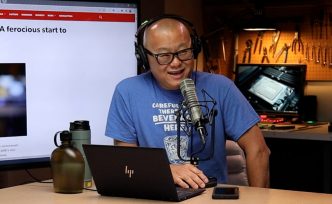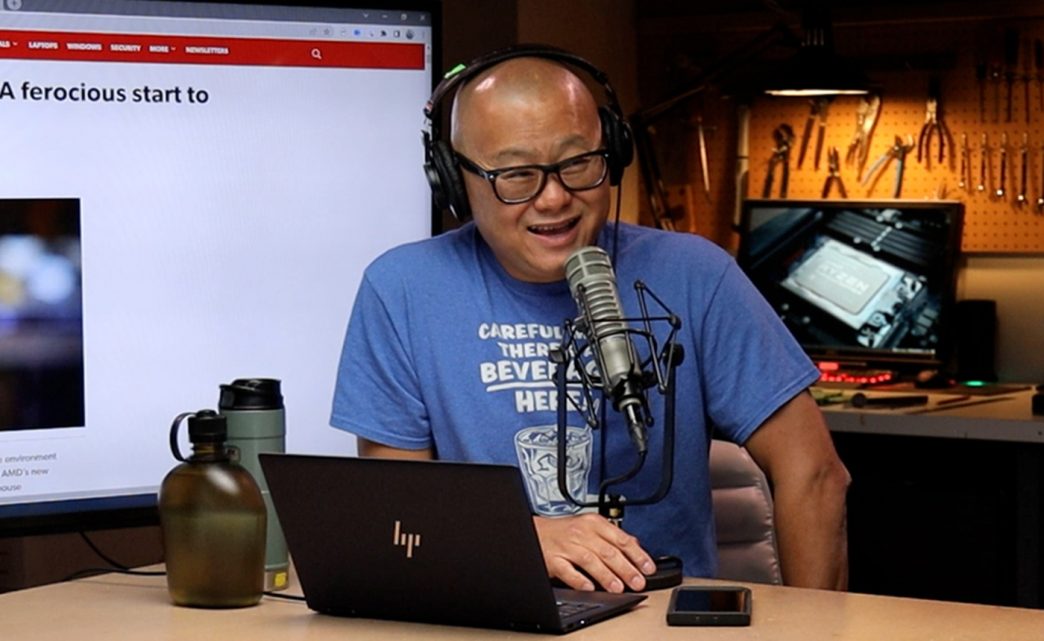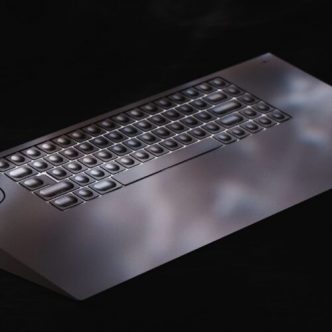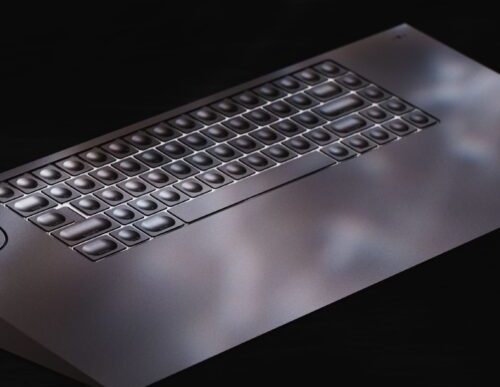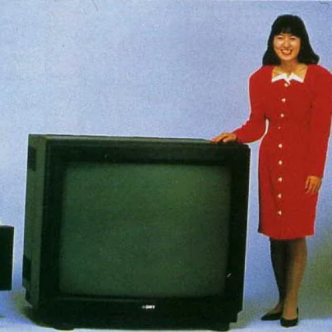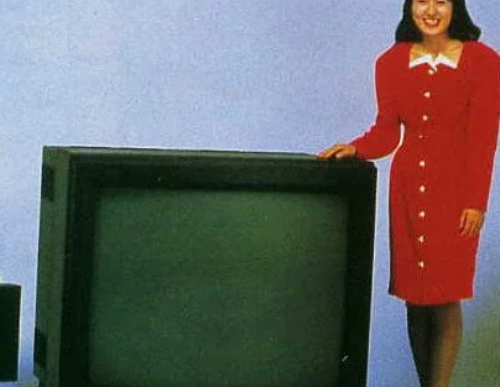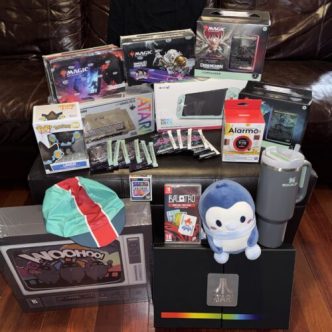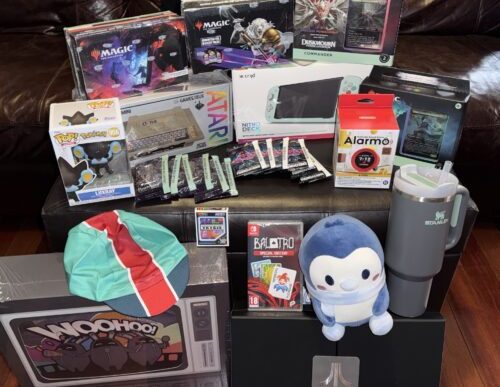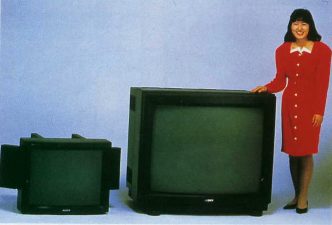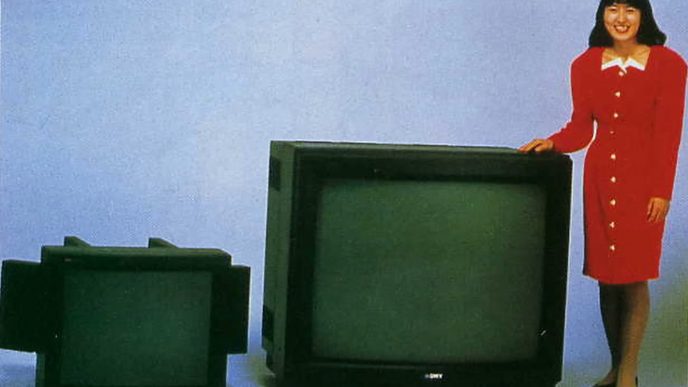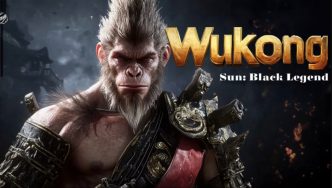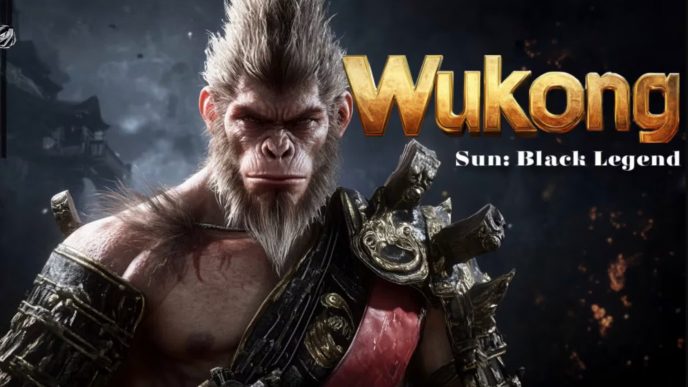
Image: Foundry
PCWorld executive editor Gordon Mah Ung, a tireless journalist we once described as a founding father of hardcore tech journalism, passed away over the weekend after a hard-fought battle with pancreatic cancer. Gordon was 58, and leaves behind a loving wife, two children, older sister, and mother.
With more than 25 years’ experience covering computer tech broadly and computer chips specifically, Gordon’s dogged reporting, one-of-a-kind personality, and commitment to journalistic standards touched many, many lives. He will be profoundly missed by co-workers, industry sources, and the PC enthusiasts who read his words and followed him as a video creator.
Gordon studied journalism at San Francisco State University and then worked as a police reporter for the Contra Costa Times in the late 1990s. In 1997, he joined Computerworld (a PCWorld sister publication) before I recruited him to join boot magazine (later re-launched as Maximum PC), where he would ultimately lead hardware coverage for 16 years.
At Maximum PC, Gordon developed his trademark voice that blended a hardcore passion for PC tech with non-sequiturs, deadpan humor, and occasional bursts of outrage. As a very early podcaster in the tech space, Gordon’s “Rant of the Week” segment on the Maximum PC pod became so legendary, someone made a soundboard of his best sound bytes. (Caution: It can get a bit NSFW in the finest Gordon tradition.) As I listened to his rants from my office, he always had me guessing, “Is he really that angry, or is he playing us?”
And that was part of Gordon’s genius. His number one commitment was to investigating the story, informing the public, and helping people make the best technology decisions. But layered on top of all of this was a master showman who effortlessly connected with like-minded enthusiasts.
During much of his time at Maximum PC, Gordon was the lead designer, builder and dreamer behind the magazine’s annual Dream Machine project, which entailed creating the most outrageous, high-performing PC possible. Throughout these building endeavors, he cemented his relationships with Intel, AMD, Nvidia, and other hardware manufacturers too numerous to mention.
Gordon’s goal was to get the newest, best, most high-performing parts before anyone else. And it didn’t end with CPUs and GPUs. If a piece of technology went into a PC build, Gordon had an encyclopedic knowledge about all of it—memory, storage, PSUs, cases, cooling, and beyond.
Gordon was also the unnamed author of Maximum PC’s consumer-advocate “Watchdog” column. As the mysterious Watchdog, Gordon responded to reader complaints about fly-by-night companies and failing products, and applied all his investigative skills to help readers reach a resolution. It was a perfect merger of consumer service, deep reporting and tech smarts that only Gordon could own.
Sort of like Star Trek’s Scotty who preferred sticking to his technical manuals, Gordon resisted taking the helm of Maximum PC, but eventually agreed to become Editor-in-Chief in 2014. Flash forward to later that year, when I once again asked for his help—this time to join PCWorld as executive editor in charge of hardware.
At PCWorld, Gordon immediately began imprinting his knowledge and personality on our articles and video. His deep-dive CPU reviews were epic, and continued a legacy of no-BS chip coverage that nonetheless earned the trust and respect of the companies he covered. Some of his first segues into video took the form of our Hardcore Hardware series where he married his deep wealth of knowledge with trademark Gordon theatrics.
-
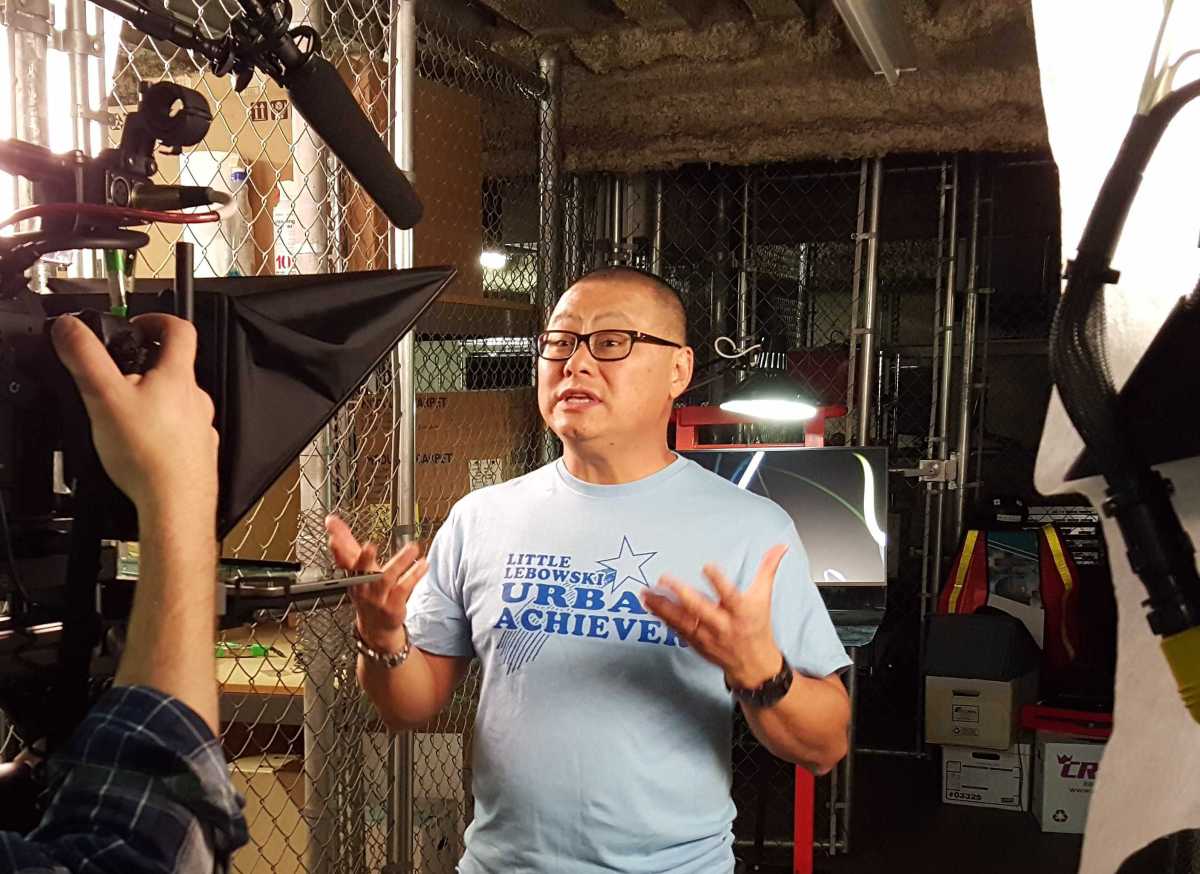
Some of Gordon’s first forays into PCWorld video were for his “Hardcore Hardware” series, which was shot in the bowels of our San Francisco office space.
-
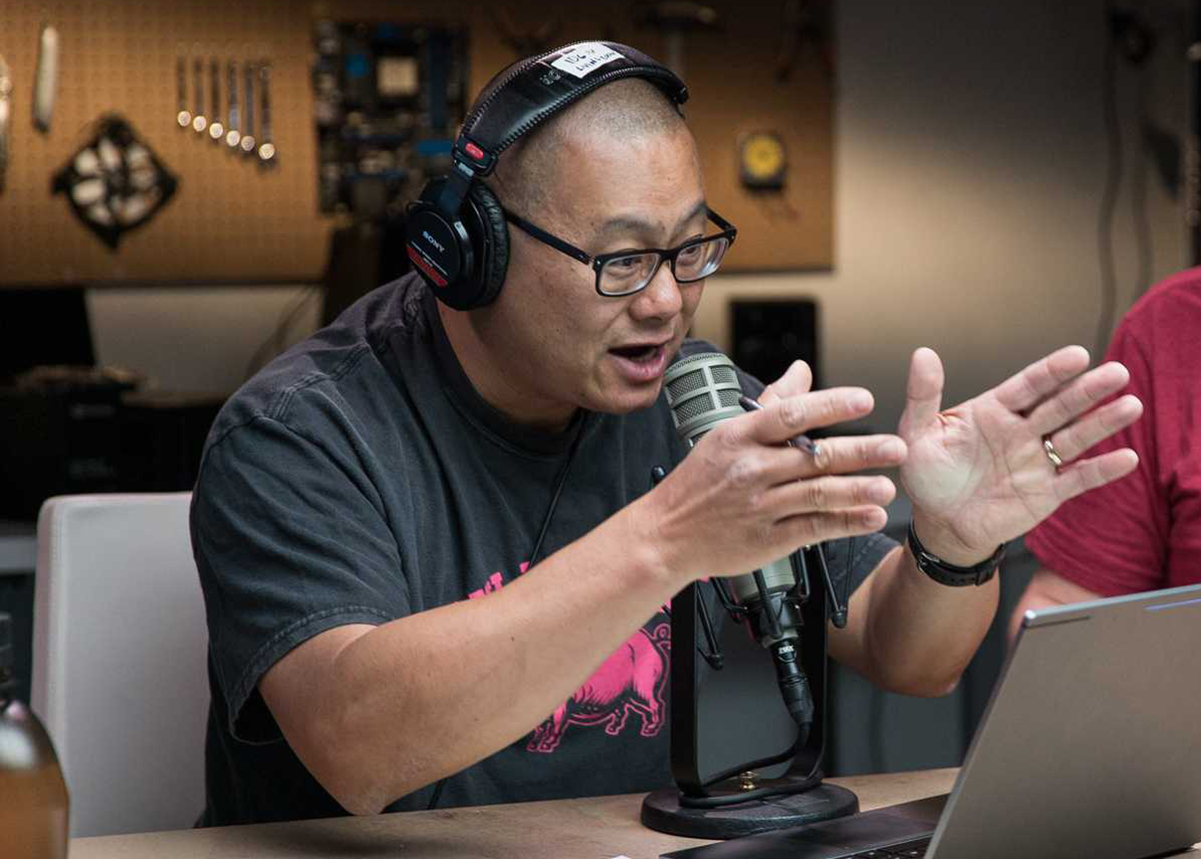
A master showman, Gordon always knew how to connect directly with his YouTube audience.
-
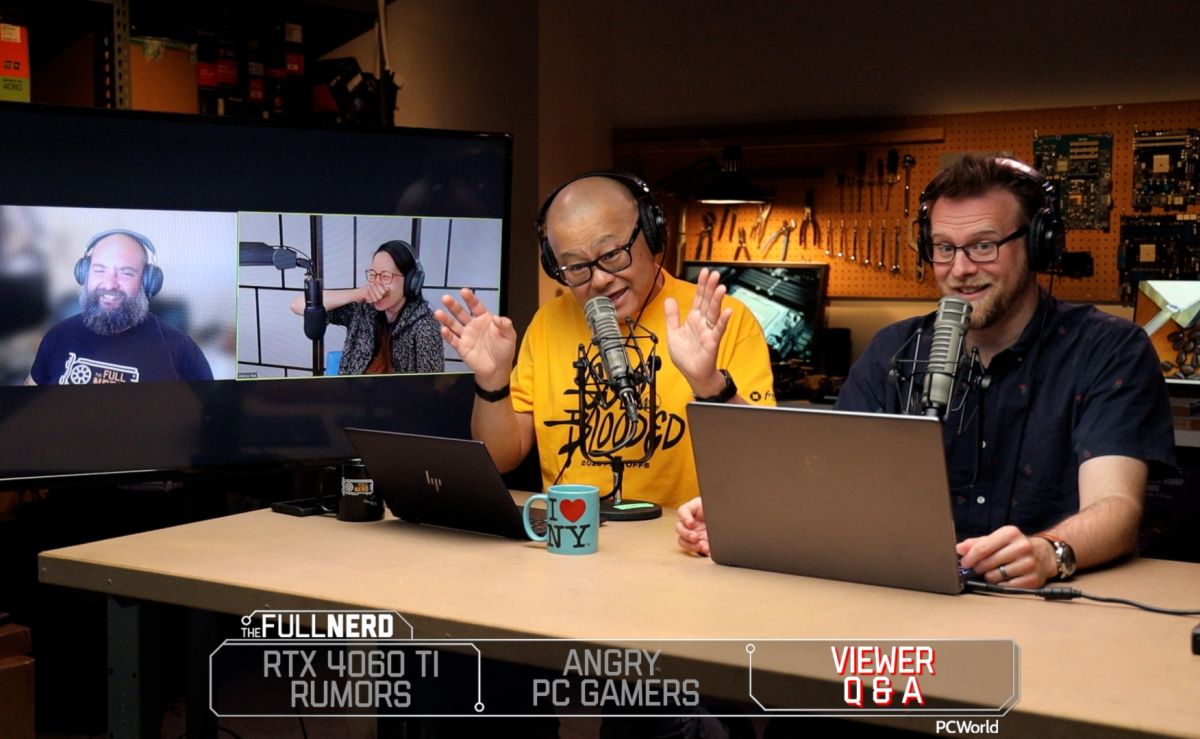
Gordon’s infectious personality always kept The Full Nerd crew in stitches. Here he’s leading the viewer Q&A segment, in which live stream participants lined up to tap Gordon’s deep wealth of PC knowledge.
But it wasn’t until we launched The Full Nerd video podcast in 2016, and set Gordon loose on many more video formats, did he come full circle as a creator. As the host of The Full Nerd, Gordon was able to deliver all his knowledge and analysis at a much faster pace—and if you’ve seen The Full Nerd, you know just how much he loved everything the PC scene has to offer.
Through his expanded presence on The Full Nerd, Gordon developed deep relationships with not only other YouTube creators, but also with dedicated followers. You could almost hear his fan base cheering him on via the comments feed during live shows. I have often thought that the way Gordon shared his reporting in print and on podcasts served as model for what PC hardware YouTube would become—unapologetically nerdy, opinionated, and full of attitude. But Gordon always delivered a crucial additional element: a legit journalism background and all the rigor it entails.
Gordon continued to shoot video and appear on The Full Nerd until weeks before his death. Talk about a commitment to beat coverage. He was following the story to the very end.
I met Gordon in journalism school and spent a lot of time with him in the trenches—sharing cubicle spaces, and hearing him riff. I’ll remember his endless debates with co-workers (his bob-and-weave rhetorical style was as maddening as it was entertaining). I’ll remember his two-hour long phone interviews with sources (he interrogated them like a pro, but played the long game in cultivating trust). I’ll remember his reliability in always asking about the TPS reports when some bureaucratic email landed in our inboxes. I’ll remember him slyly trolling me by calling the series “Star Track” even though I’m 99 percent sure he knew that’s not how it’s pronounced.
He might have been the staff curmudgeon, but he was also our most fun co-worker, bar none.
I’ve long held this romantic notion, maybe foolishly, that journalists are immortalized by their canon. And of all the tech journalists I’ve personally known, no one has a deeper canon, and has touched more followers, and has earned more respect from industry heavyweights than Gordon. From his earliest days on Maximum PC to his last days on PCWorld and the Full Nerd, Gordon touched people in a way I just haven’t seen anywhere else. He’s leaving a gaping hole in the hearts of those who loved him, but what he’s given us lives forever. – Jon Phillips, editorial director, PCWorld
Gordon’s family has launched a GoFundMe to help cover medical expenses. Please donate to them if you can.
Gordon Mah Ung, remembered
Here are more reflections from those who knew Gordon well. If you’d like to share some thoughts on what Gordon meant to you, please email Brad Chacos, PCWorld executive editor, at bchacos@pcworld.com. Unfortunately, we will not be able to add all submissions to this article.
‘The journalist and person I wanted to be when I grow up.’
Here’s something Gordon never knew. He was the beacon for my career before I even had my career. I was born in the early 80s. I was a wide-eyed teen when Gordon was blazing trails in boot and Maximum PC in the late 90s. This was my introduction to enthusiast PC culture, long before the Internet exploded.
After spending years unloading trucks and working in factories, I eventually took the plunge into tech journalism. I had $2,000 in the bank and a 6-month-old daughter, but I wanted to do what Gordon did. I ground out endless $15 articles on a content farm called Demand Media. I was eventually added to the tech vertical, which Salon syndicated. And those Salon clips got me a freelance gig with Maximum PC’s nascent Web Blog. YES!
The first time I got an email from Gordon with insights on something I was working on, I swooned—and listened, and hustled. Eventually I was fortunate enough to work alongside Gordon at PCWorld, then become his co-host on The Full Nerd, and loooong after that, his boss. (WUT!) I learned so much from him. Gordon always remained my inspiration; the journalist and person I wanted to be when I grow up. He still is.
He never knew that. I wish he did, because Gordon literally changed my life. Follow in the footsteps of greatness, kids. And Gordon was the GOAT. — Brad Chacos, PCWorld executive editor and Gordon Mah Ung stan
Brad was Gordon’s co-host on The Full Nerd podcast and wrote a separate article remembering his favorite episode — a masterclass in what made Gordon Gordon.
‘He remembered who came before him, and created space for those who would follow’
I may write for a living, but I can’t do justice to Gordon in words. But I know he would nudge me, as he always has, to go for it. See where it takes me.
PC building is what led me to cross paths with Gordon—I first met him while sneaking peeks at the wild and wonderful PC builds on the other side of my cubical wall. At the time, I was a video games journalist, covering a platform I’d later get mercilessly razzed about on The Full Nerd.
But I liked tech, and I liked learning about PC hardware. It was a trait that Gordon encouraged, nurtured, and transformed into an entire new branch of my career. Gordon was the kind of guy who did that casually, too. His profound love for PC hardware made him open and generous, always actively keeping seats open at the table for others. He remembered who came before him, and created space for those who would follow him.
In every capacity I’ve known him—boss, mentor, colleague—he taught me to stay humble, lead with curiosity, and remain fair in coverage. Combined with his laser-sharp precision and analysis, his example forever motivates me to think deeply and thoughtfully. The industry will not be the same without him. —Alaina Yee, PCWorld senior editor and Maximum PC alum
‘He welcomed me in and let me know I belonged’
Newsrooms attract characters. Misfits, hopeless optimists, unrepentent goofballs, anti-establishment types, lovable weirdos, and willful contrarians. Gordon was all of those things, but most of all, he was kind.
He was always first in line to help a friend in need. When there was an emergency, he ran toward it. I don’t think he was a Boy Scout, but he was always prepared.
When I was the new guy at Maximum PC, I knew all about computers and nothing about magazines. Gordon didn’t care. He welcomed me in and let me know I belonged there. He answered all of my stupidest questions, helped me when I needed help, and let me make mistakes when I needed to mess up. And he made sure that we all got into good trouble on the reg.
He taught me that our job, as editors, is always to serve the reader. It didn’t matter that advertisers paid the bills; the people who trusted us to give them advice and guidance were always our number one priority. It was his guiding principle and he lived it every day. He was never afraid of speaking truth to power in service of the reader. And he taught so many young journalists to do the same.
I already miss my friend terribly, but I’m profoundly grateful that I got to share a small part of his journey with him. The world is a worse place without him. —Will Smith, Full Nerd regular and former Maximum PC editor-in-chief
‘Gordon was always at the center of it’
I hardly need to list Gordon’s many great attributes—he was a beloved legend in the PC community for a reason. But I’m among a smaller number of people who had the privilege of working with him day to day on a team, first at Maximum PC and then PCWorld. Despite being a larger-than-life figure for both of those brands, Gordon was the consummate team member—always willing to patiently explain something, always down to riff and collaborate, always kind and respectful of others. He seemed to genuinely thrive on the group effort.
My favorite work memories are of the Maximum PC bullpen where the staff would banter and laugh seemingly all day—it’s amazing we ever got anything done. Gordon was always at the center of it. He was a truly outstanding individual who I’m proud to have worked with and know as a friend. —Katherine Stevenson, PCWorld managing editor and Maximum PC alum
‘Gordon was the newsiest nerd I’ve ever known’
It’s fair to say Gordon helped define what PCWorld is today, from our mission to especially our voice. I grew up in a newsroom, and Gordon was the newsiest nerd I’ve ever known: utterly dedicated to depth, accuracy, and context, but with a cynical, collegial sense of humor. He also cared deeply about understanding how tech worked and unearthing its deep, dark secrets that manufacturers glossed over. The man simply loved his job. We all loved him. – Mark Hachman, senior editor, PCWorld
‘We are fortunate to have had someone so genuine fighting for us’
Gordon Mah Ung is an irreplaceable force of good for this industry and for consumers. His background in police reporting and journalism afforded a strong foundation to his work and a unique perspective not found anywhere else in the computer reporting business. Like many others, Gordon’s work in Maximum PC inspired me long before I was ever in the industry.
Back when I was in high school, I would buy magazines Gordon wrote for every month. In particular, his “Watchdog” consumer advocacy columns inspired our own similar content. He knew when and how to push back to protect consumers, and Gordon served as a mentor for me.
Gordon was kind enough to regularly listen to my rambling as I sought his advice and experience, navigating complicated issues of ethics and conflict. He always brought grounded, sobering advice. I still can’t believe that I have been fortunate enough to have worked alongside a hero of mine, and still cannot believe his passing.
Gordon and I got along from day one, and I will forever keep his perspective in mind. His presence at events will be greatly missed. Gordon Mah Ung has long been my favorite co-host in videos for his “real” demeanor and his candor; he is exactly who he presents himself as on camera, and we are fortunate to have had someone so genuine fighting for us in this industry. Gordon, thank you for everything you have taught me, and thank you for unwaveringly looking out for consumers. —Steve Burke, editor-in-chief, GamersNexus
‘If Gordon praised my system, it felt like I’d won an Oscar’
Gordon reviewed our PCs for 25 years, and he has written more kind words about my company than anyone. It’s a bittersweet honor to offer a few words about Gordon in return.
For the first decade I knew Gordon, I learned little about him personally. He was like a test we had to pass. At Maximum PC, he was the ultimate authority on whether the systems we were building were worth anyone buying. If Gordon praised my system, it felt like I’d won an Oscar. But he never let a missed detail get by him, and trying to impress Gordon has become a constant of my career. I would not be where I am today without Gordon’s approval.
But over the years I was fortunate enough to get to know Gordon a bit personally. I always felt privileged when he’d call me for long off-the-record talks about the latest PC industry intrigue, and we’d inevitably tangent off to talking about Aliens or Star Trek, or “the kids building PCs these days who don’t know how easy they have it.” Gordon was a kindred spirit: an O.G. sci-fi and computer nerd who loved tech, and always remembered the point of the hobby was having fun with cool toys.
But the biggest impression he made on me was when he and his family stopped by my shop a few years ago. Such wonderful people, and I was so impressed by his children: kind, smart and funny—exactly whom you’d expect Gordon to have made the world better with. Meeting them, I learned his legacy was not just in what he wrote, but in who he taught, and who he loved. Thank you, Gordon.—Kelt Reeves, Falcon Northwest
‘A truly inquisitive journalist, he sought the stories behind the stories’
Most of us know Gordon as a long-time tech journalist, as one of the best and the most passionate in the industry. Gordon was a truly inquisitive journalist, he sought the stories behind the stories by taking a real interest in the products, companies, and the people behind them.
I was lucky enough to know Gordon as a friend. We checked-in often with one another. I would ask about his health, and he would ask about my flying. Occasionally, we’d talk industry updates but most of our conversations were about family, friends, life, and the things that matter most. He was so proud of his family, not too long ago sending me Halloween Ghostbusters pics and the amazing photos his son took at an air show last year. I will miss our conversations and my friend. He was one of the best and forever will be. —Frank Azor, Chief Architect of Gaming Solutions, AMD, and Alienware co-founder
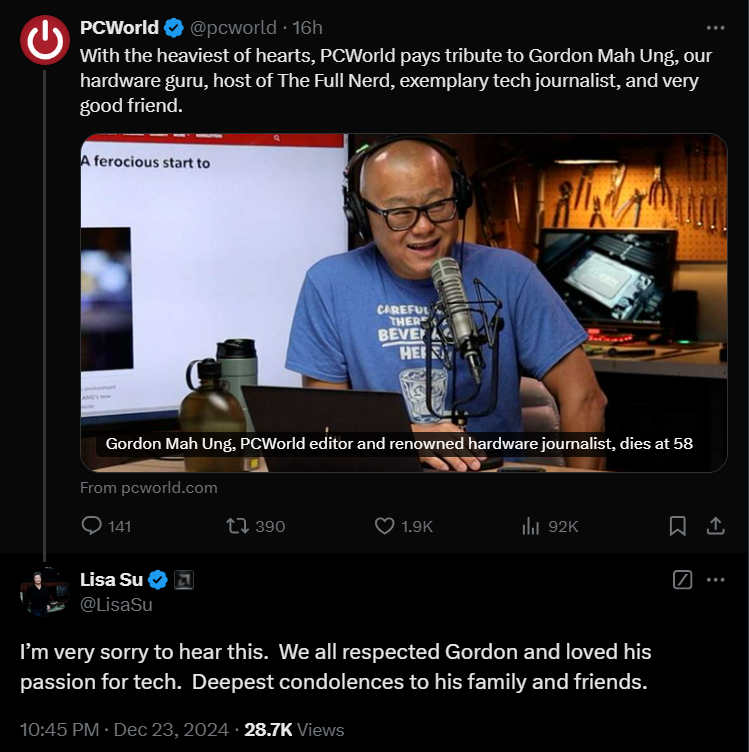
‘Any good work I do reflects at least in part on Gordon’
If you’ve ever done research on anything technical, chances are you’ve read something Gordon wrote. His keen intellect and razor-sharp wit helped him connect the dots on both the technology and the people that make up our modern world. His talent for investigation was honed over a long and storied career; he was a force in our industry. I will miss his advice and insight, as I am sure will many others.
Often one can infer a lot about a person from their writing, and while I’m sure a kind reasonableness comes through clearly in Gordon’s writing, his was a type of kindness and patience that is exceedingly rare. Gordon always loved to chat, find out what you were up to, and was always kind and thoughtful. While his writing and insights have become a part of computing history, any good work I do reflects at least in part on Gordon because of his positive influences. So, in that way, he will live on in the work of others.
I will forever have fond memories of our many chats, and while I’d love to have just one more chat, I am thankful that he is able to rest for a while. —Wendell Wilson, Level1Techs
‘An endorsement from Gordon could catapult a brand to success’
Gordon shined a spotlight on the small businesses that thrived within the DIY PC building community. He was unapologetically critical, so an endorsement from Gordon could catapult a brand to success. Fearlessly advocating for consumers, he stood on the frontlines, championing fairness and quality. We listened to his stories, laughed like old friends, and connected through a shared passion. Gordon was truly the GOAT of the PC community—a legend who will never be forgotten.
Maximum PC’s annual “Dream Machine” issue catapulted sales for brands featured in it—especially small businesses like mine. I remember Ben Rising from Mountain Mods having his UFO case spotlighted alongside my billet radiator grills. When I met Ben years later, we both agreed that Gordon’s feature brought massive exposure. Gordon gave me the opportunity to build the official Star Trek PC for an article. He championed countless small brands like CaseLabs because he genuinely believed in their work. Silverstone’s legendary TJ07 case was born from Gordon’s feedback. What Jay Leno is to cars, Gordon was to desktop PCs—a true enthusiast, advocating for all of us. —Bill Owen, Mnpctech
‘Gordon was uncannily skilled at demystifying complex technology’
Gordon Mah Ung wasn’t just the most talented tech journalist of his generation; he was one of the best tech journalists of all time. Brutally honest, yet eminently humble, Gordon was uncannily skilled at demystifying complex technology for readers of every stripe. Both in writing and during live podcasts, Gordon schooled and entertained us with his wicked sense of humor. – Michael Brown, executive editor, TechHive and boot magazine alum
‘I’m one of the very few people who has seen Gordon in a suit and tie’
Few people can say about someone, “I knew him when.” I have the honor of saying that about Gordon Ung.
I was a junior editor at PCWorld when Gordon arrived as an intern. This was OG PC times: We still used 5.25-inch floppy disks (3.5-inch disks were the new hotness); we argued about IDE vs. SCSI interfaces; and there was only one speed of CD-ROM drive.
That means I’m also one of the very few people who has seen Gordon in a suit and tie, which he wore on his first day. We told him he could dress like a normal person starting tomorrow.
Who knew then that he would go on to build an illustrious career in PC building and gaming that would culminate in “Full Nerd.”
Maybe I don’t miss waiting for Gordon to drop his 4,000-word CPU review with 18 charts into my lap, a few scant hours before the NDA lifted. But I knew he hadn’t slept the last two days, so what was one late night for me. I do miss how Gordon and I could casually sprinkle “Star Trek”’and “Star Wars” references into our daily conversations and totally understand each other.
Gordon was a touchstone for me: part of my earliest days at PCWorld, and part of my proudest days there a quarter-century later. Farewell my friend. —Melissa Riofrio, former Executive Editor, PCWorld
‘Gordon showed his soft side through his photography.’
I’ve had the great privilege of reading Gordon’s work before even entering college. As an owner of the very first issue of boot Magazine, I followed his journey from beginning to end. However, our paths crossed when I contributed to the magazine after it was renamed to Maximum PC, and had the chance to meet Gordon and become his friend in 2001.
Although not many people know, outside of the ever changing world of PC tech, Gordon was a deep lover of photography and I had the chance to experience this with him. We both shared a mutual love for a hobby that was far slower in pace than how fast technology evolves. Through this, I would learn that Gordon was actually a very patient person—and you can see that given the relationships in the PC gaming community that he cultivated in a way that was only possible with love and care. His photography was the same. Gordon actually bought a lens from me in 2003.
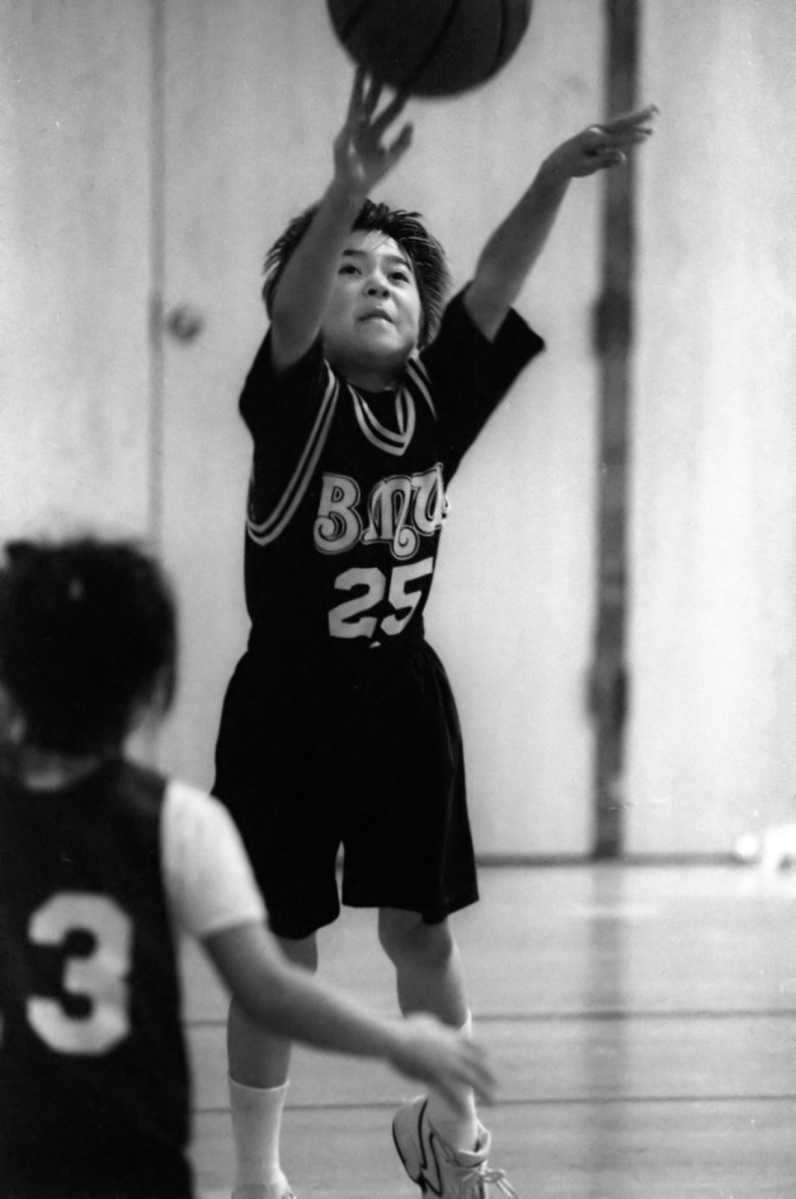
A photo of a young basketball league player shooting hoops.
Gordon Mah Ung/IDG
I have a photo that Gordon took that he sent me many years ago. It’s the only personal photo related to Gordon that I have. We talked about photography endlessly. And while in print and online Gordon would not cut any technology company an ounce of slack, Gordon showed his soft side through his photography.
In 2015 when Maximum PC recruited me to be its EIC, I reached out to Gordon immediately and talked to him about the role. I actually tried to convince him to stay and perhaps let me take on a hardware editor role instead, but he was adamant that he was going to try something new. After I joined, I was given a tour of the office and passed by Gordon’s old desk. I had never seen a space or desk that was buried under so much hardware—even an old 3dfx Voodoo 1 was there. I knew then, I would never be able to fill his very large shoes. RIP Gordon. I’ll see you in the pages we once shared. — Tuan Nguyen, former Maximum PC editor-in-chief
‘I will always remember showing off the first Ryzen system and Gordon stepping forward to be the first journalist to get hands on and experience it’
Gordon is the pinnacle of tech journalism, authentic to his core and still engaging and fun to be around, work with, and listen to. I will always remember Sonoma, showing off the first Ryzen system and him stepping forward to be the first journalist to get hands on and experience it. He played it so cool, and then later told me how awesome it was — and how bad my poker face was.
We will all miss him and tech journalism will never be the same but we are undoubtedly better for having known him. — James Prior, former AMD senior product manager
‘Gordon’s candor made me want to be more candid. His determination made me want to be more determined.’
Gordon wasn’t afraid to be the lone voice. I doubt I’m the only one who’s said that today, but it’s what made him a legend. He believed what he believed—and more importantly, he said it, as if 12 Angry Men were about why the 1080 Ti was overhyped.
It made a major impression on me. More importantly, it made it easier for me (and maybe everyone at PCWorld, though I don’t want to speak for others). Publications have souls. The masthead obscures that fact over the years, lends some semblance of continuity, but publications inevitably take on the personalities of the people who work for them.
Gordon’s candor made me want to be more candid. His determination made me want to be more determined. His curiosity made me want to be more curious. His knowledge made me want to be more knowledgeable—and he had a lot of knowledge. Gordon could rattle off the clock speed of a 30-year-old CPU like it released last week.
When he hated something, he could channel a certain two-middle-fingers attitude better than just about anyone. But when he loved something, he’d be first over the wall to champion it. He had integrity, that rarified kind we associate with the best journalists. Sure, we were only covering PC hardware—but he covered PC hardware with the care and consideration of a true newspaper stalwart. And he never seemed to get tired of it, even after decades in the trenches.
That’s Gordon, journalist and mentor.
But I think it’s just as important to mention Gordon, the friend. He was hilarious. He always made time to chat with me when I came into the office—often hours of time. It meant (and still means) a lot to me. If I could leave you with one image of the man, something that I think sums him up:
PCWorld had these tiny little cubicles, but Gordon was never there. He was always in the PCWorld lab, running a half-dozen benchmarks, his actual desk covered in boxes full of to-be-reviewed hardware—so much hardware that it usually spilled into the adjacent cubicle (or two). The guy loved PCs, and he loved the job, and we loved him. — Hayden Dingman, PCWorld alum
‘You couldn’t help to be better. Gordon just had that effect on you.’
Gordon was THE standard I would use to determine if I was going to buy in on PC hardware or not. For decades. If it met the Gordon standard, it was legit gear…period.
Years later when I was working in the tech biz at Creative / Sound Blaster I had the absolute honor to sit on the Full Nerd with all of you, talking about audio hardware and it’s relevancy to the legacy of PC and PC building. I loved sitting down with Gordon because his depth of knowledge and no-BS approach to interviewing kept you on your toes and brought out the A-game in all of us lucky enough to be in the other chair. You came out of the spot with a ton of insight and new perspective. You couldn’t help to be better. Gordon just had that effect on you.
He is a voice and talent that simply cannot be replaced. The wisdom he held was acquired and steeled in the brightest and darkest times of the PC hardware world. — Ryan Schlieper, former Creative / Sound Blaster product marketing manager
‘Always fun and upbeat, and always willing to give you a genuine, honest opinion.’
I have known Gordon personally for over two decades, and always enjoyed our conversations and times spent together at various tech events and trade shows, but my memories of him go all the way back to the beginnings of boot magazine. I was reading Gordon’s stuff and saw him on various television shows for years before I got into technology journalism and was lucky enough to befriend him. Back when I was still freelancing, Gordon also helped get me in the door at Maximum PC – which was a huge deal for me.
Gordon was such a great guy. Always fun and upbeat, and always willing to give you a genuine, honest opinion. I will think of him every time I see these on my wall (those are my first cover stories for Maximum PC and PCWorld). He will be missed. — Marco Chiappetta, managing editor of Hot Hardware, PCWorld and Maximum PC alumni
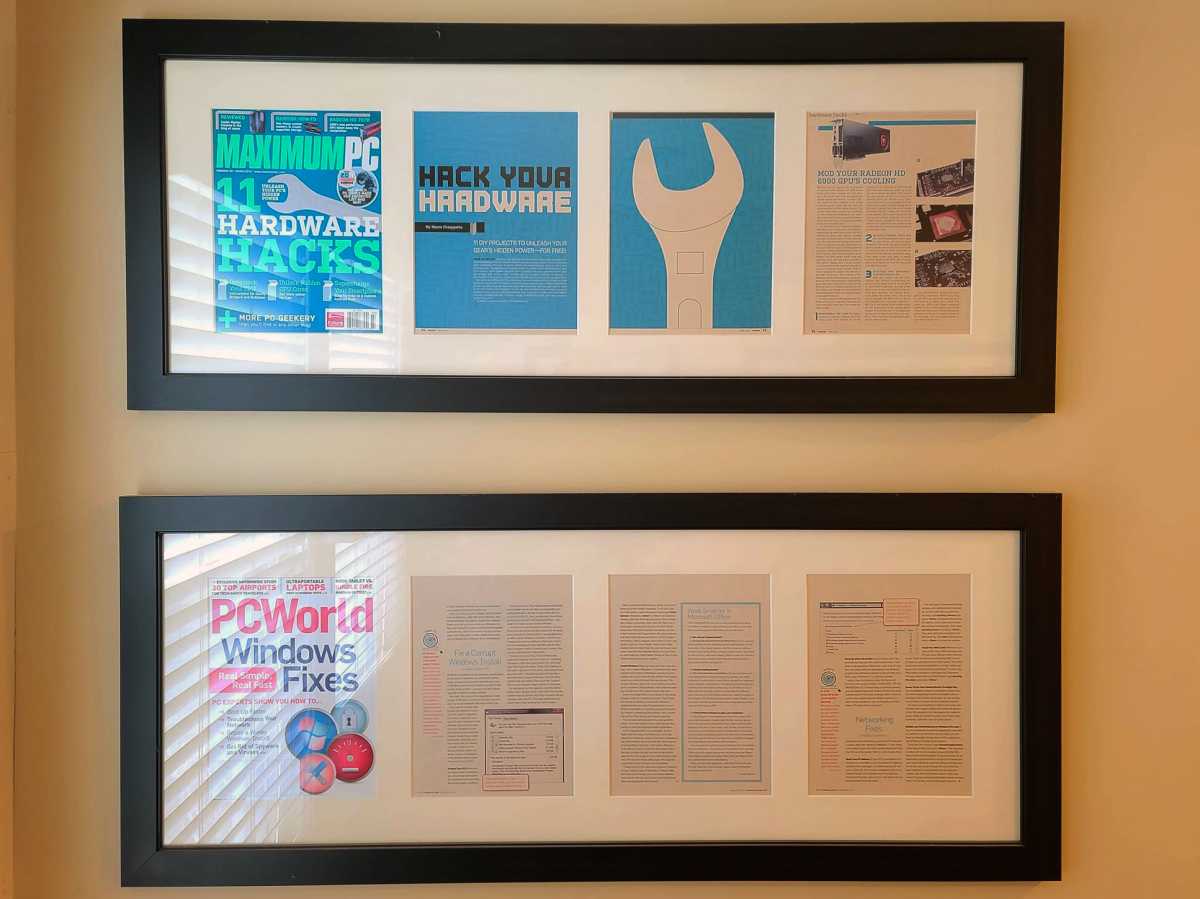
Marco Chiapetta
‘He laid into my PC (short for “Piece of Crap”) with all the gusto he gave to one of his many podcast rants, and every word of it was correct’
Gordon Ung made me look like an idiot. But that wasn’t very hard to do way, way back when I served as Maximum PC’s (tallest) associate editor. It was my first real job out of college, and I walked in with the swagger of someone who had spent too much of his college time fussing with his monolith of a desktop PC. Upon meeting Gordon, I was immediately humbled. Here was a guy with an encyclopedic knowledge of PCs and components that was only rivaled by his ever-growing stack of industry business cards. Everyone knew him, everyone loved him, and he could fix nearly any issue with a quick call or an email to a contact. He wrote, I swear, nearly half the magazine each month — and never once let an immense workload get in the way of benchmarking, accuracy, or fairness. He loved it.
But, to the humiliation. For fun, Will put Gordon and I in a head-to-head face-off one month to see who could build the best gaming PC on a restricted budget. I figured this was my time to shine. Though I couldn’t outbuild the genius behind each year’s Dream Machines, I had a chance at out-researching him. I scoured forums. I cross-analyzed all kinds of benchmarks. I came up with a parts list that looked pretty compelling, and I knew I had it in the bag once I heard glimmers of his “lesser list.” We went to the local Fry’s and bought all of our stuff, and I just squeaked in under the pricing cutoff. But once we made it back to the office, I realized my fatal flaw: I forgot to buy a case. A freakin’ case.
I proceeded to mount all my components — if you can really call it that — in the video card’s freakin’ cardboard box. This frankenPC looked as ugly as you’re imaging. It was probably a fire hazard when I started, less so once Gordon was done testing and roasting it in the subsequent Magazine write-up. He laid into my PC (short for “Piece of Crap”) with all the gusto he gave to one of his many podcast rants, and every word of it was correct. Hell, I’m pretty sure his PC’s benchmarks even beat mine. And his offering looked great: Cheap, certainly, but built to the same standard of cleanliness and perfection as anything else he’d crank out in the MPC Labs.
Though I was at Maximum PC for what felt like a sneeze compared to Gordon’s long, incredible career in technology journalism, the lessons he imparted during our many Labs hangouts have stuck with me for decades. I’ll catch my mind wandering to one of the Dream Machines when I’m building my own PC. I’ll think of our times on the podcast, including his never-ending rants, when someone in the tech industry does something unapologetically stupid. I’ll think back to his intense professionalism whenever I land a new gig, and remind myself to bring the same authoritative flair and joy for the craft that made up his incredible body of work. And I think back to our contest whenever I drive by the local Fry’s — now transformed into pickleball courts. I can only imagine what he would have had to say about that. — David Murphy, Maximum PC alum
‘A tech support guy for us tech editors’
The world has lost one of the foremost tech minds and an all-around great guy in Gordon. He was a real inspiration to me when I first started at PCWorld in 2021. There’s a big time zone difference between Australia and the U.S, but no matter what time it was, if I dropped him a message, I could always expect a reply in a short time — and no question was too banal or stupid. He quickly made me feel like part of the team.
Gordon was so knowledgeable about PCs and tech generally that if I had to use an analogy, I would say he was like a tech support guy for us tech editors. Yet he was so humble too and always willing to share what he knew. I deeply appreciated his strong convictions about tech and great sense of humor. I remember he once made me laugh by appearing on the bridge of the Starship Enterprise (in a looped video background) in a PCWorld team meeting.
Gordon had an uncanny ability to cut through the spin and find the truth of a story and wasn’t afraid to shake up the status quo. He was a true editor and journalist. But most of all he was just a “top bloke,” as we say in Australia — and someone I’ll always be thankful to have known. — Dominic Bayley, PCWorld Australia editor
‘He didn’t have to do any of that—he did it because that’s who Gordon was.’
When I became Art Director at Maximum PC Magazine, I had no idea who Gordon was or the kind of celebrity he was. That changed during a dinner with some old friends from Lucasfilm in LA. When they asked what I was up to, I quietly mentioned Maximum PC. One of them immediately lit up, “Wait—Maximum PC? Do you work with Gordon Mah Ung?” I said yes, and they couldn’t stop talking about how much they admired him and followed everything he wrote.
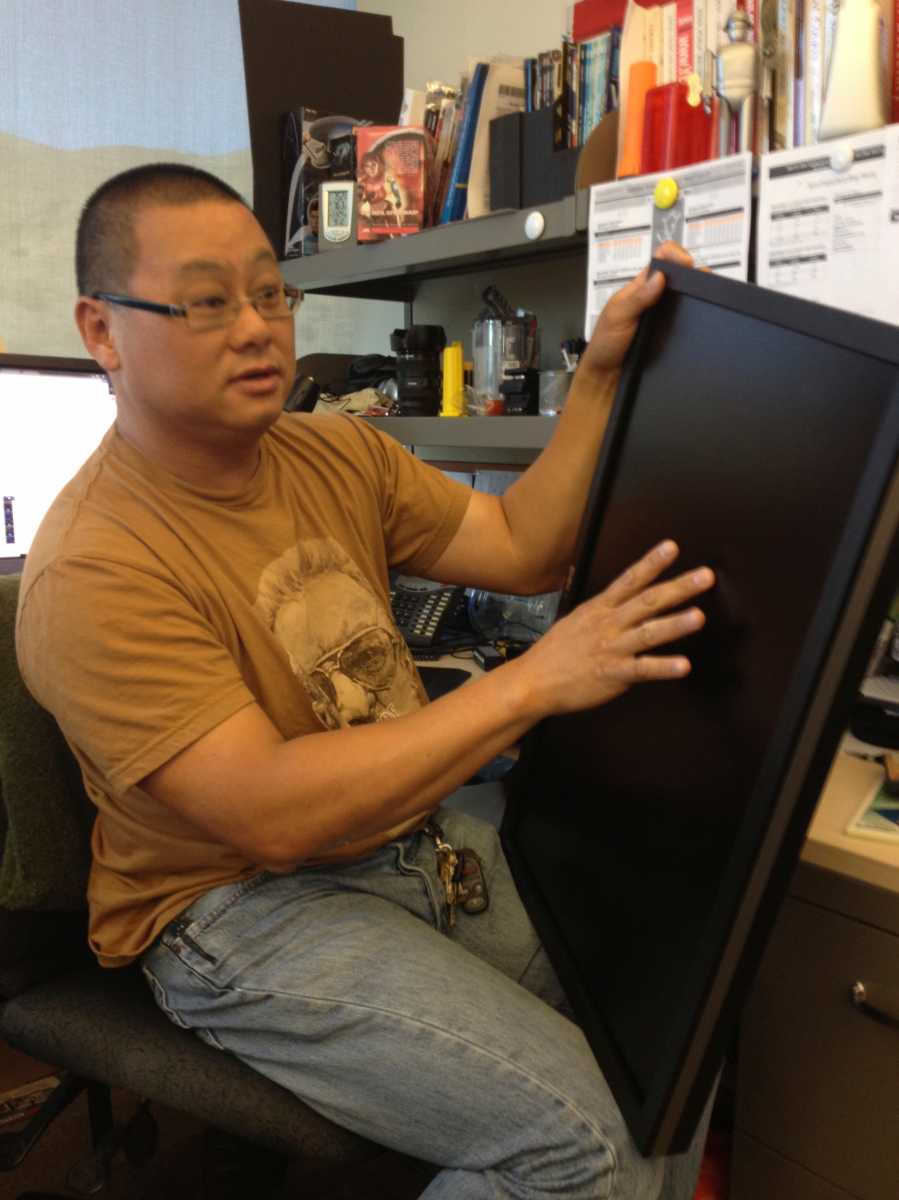
Gordon explaining the “new i-pad” to me.
Richard Koscher
Gordon and I became cubicle neighbors and friends in our open office. I put up my Austrian flag on the wall, and in true Gordon fashion, he made sure the American flag he hung next to it was a quarter inch higher. He’d tease me constantly—about Europe’s “tiny” space programs compared to NASA and about being an Apple user in his Maximum PC world. He never let up, but it was always in good fun.
When Future decided to move the magazine back to the UK and I was laid off, Gordon was the first to step up and wrote me a reference letter. I’ll never forget what he wrote: “I’ve never met anyone who worked so fast. He works with inhuman speed” I believe we held mutual respect for each other’s skills, and he even went out of his way to help me secure interviews at NVIDIA and other companies. He didn’t have to do any of that—he did it because that’s who Gordon was. Kind. Honest. Good-hearted. Someone you could actually talk to. You left us way too early, and I’ll miss you, my friend. I can’t wait to catch up with you again on the other side. — Rich Koscher, former Art Director at Maximum PC
‘I’ve been following Gordon’s work for over 20 years, since I was a 12 year old kid just finding out about how cool computers can be.’
I’ve been following Gordon’s work for over 20 years, since I was a 12 year old kid just finding out about how cool computers can be. Every month my mom would bring me to the book store and I would pick up the latest issue of Maximum PC. I remember Gordon’s excellent columns in Maximum PC with his signature snarky take. I’ve been a weekly listener of Full Nerd since it launched. I have had countless laughs and “hell yeah” moments as Gordon draws the analogy between PC hardware and 7 mpg muscle cars. We think alike in that respect: “bigger bar better.” It’s people like Gordon that lead geeks like me into careers in the tech space and to foster our passion for technology. I will truly miss Gordon. — Ken Ottaviano, longtime Gordon Mah Ung fan
Author: Jon Phillips, Editorial Director, North America

Jon has been covering all manner of consumer hardware since 1995. He brought the Bitchin’fast!3D2000 to market in 1999, and has ran MaximumPC, Mac|Life, Mobile, Greenbot and Macworld, among other consumer tech magazines and websites.
